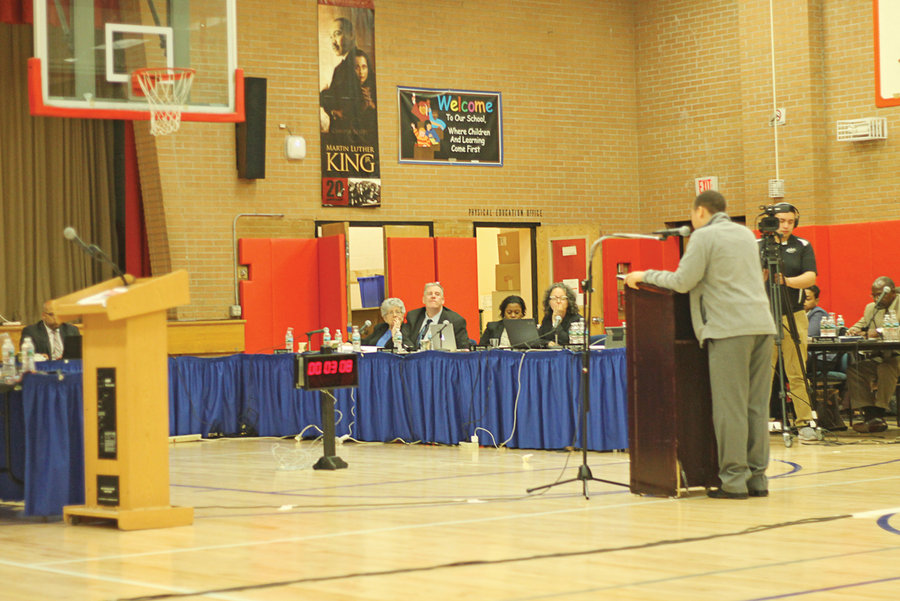Board of Education members are conflicted over a new nepotism policy that would restrict board members, administrators, and others from recommending the hiring of family members or participating in negotiations or discussions involving their salaries and other matters.
The board considered and rejected a strict ethics policy at its April 21 meeting.
Board Trustee Ellen Simon attempted to have the policy resolution tabled in order for further discussion, but Trustee Gerald Lyons asked the board to vote down the policy, citing some of its language.
Simon’s motion to table failed, and the board voted down the policy.
The policy, which was recommended by the New Jersey School Boards Association (NJSBA), the publicly-financed lobby for the state’s school boards, would set criteria to determine whether or not a board member has a disqualifying conflict of interest.
But it comes at a time when it is already unclear what Jersey City’s school board members can and cannot vote on.
“This is not legislation aimed at this particular board,” said Simon, who supports the policy.
“We’re being told we cannot do this or that.” – Trustee Joel Torres
____________
Some of the board members elected in 2014 with union endorsement claim that they have been restricted from taking committee positions and have been left out of critical contract discussions.
Lyons said the majority of the board, most of whom were not endorsed by the unions, has placed restrictions on other board members using a “questionable” legal ruling by the board attorney.
Board member Joel Torres said the new policy would create an even larger disparity.
This dispute has already had an impact on the renewal of the school superintendent’s contract. Board members with family members employed in the district were not allowed to vote on the superintendent.
Board member Marilyn Roman, for instance, has a cousin employed, and under ethical regulations, could not vote on the superintendent’s contract.
Board members such as Lyons and Torres said these rules limit their ability to do what they were elected to do.
Stricter ethics rules introduced
The new policy would have set additional rules on whether a board member can take part in a board activity. It would intensify the conflict on the local school board since the policy could be used by the board majority to limit some members from involvement in employment decisions, participation in the collective negotiations process, and voting on negotiated agreements.
The policy could even have been used to limit who can vote on hiring school administrators, superintendents, or even the vendor that is part of the superintendent search and evaluation process.
Although the policy seems logical, the NJSBA actually expanded the definition of “relative” and “immediate family member” beyond what the state considers a conflict of interest. The policy would include in-laws, cousin, cohabitating partner, and step daughter-in-law and any other personal or professional relationship than merely the immediately family that state regulations recognize.
A relative, according to the policy, shall be defined as an individual’s spouse, civil union partner, domestic partner or the parent, child, brother, sister, aunt, uncle, niece, nephew, grandparent, grandchild, son-in-law, daughter-in-law, stepparent, stepchild, stepbrother, half brother, or half sister, of the individual or the individual’s spouse…whether related by blood, marriage or adoption.
“We’re being told we cannot do this or that,” said Torres. “This policy is more restrictive even though we have a certain level of responsibility. This is an ethics policy that no one else has to follow but those who adopt it.”
Torres said the policy would exclude members from doing what they were elected to do, such as negotiate contracts and select administrators like the superintendent of schools.
The NJSBA, however, has argued that the expanded definition allows districts to restrict the perception of a conflict among members. But the policy goes well beyond the board members and also applies to those employed by the school district, such as high level school administrator.
“In order to avoid both the reality and the appearance of a conflict of interest in employment, [the board] will not appoint a relative of a board member or superintendent to any employment position in this district,” the policy said.
A superintendent would be prohibited from even making such a recommendation to the board. The superintendent would also be prohibited from placing any direct relative to a position overseen by a relative.
“Where it is not feasible to eliminate such a direct or indirect supervisory relationship, appropriate screens and/or alternative reporting mechanism shall be put into place,” the policy said.
Board members who feel they might be conflicted would be advised to seek further assistance of the board attorney.
In Jersey City, the board attorney had tended to side with the majority, leaving minority members frustrated.
Ron Greco, representing the teacher’s union in Jersey City, protested against the rule. Holding up a picture of Donald Trump, he asked, “What joker authored this policy? This is a GOP charade.”
The teachers’ union has been very critical of Schools Superintendent Dr. Marcia Lyles and have endorsed candidates for election over the last two years the union believed would oppose renewing Lyles reappointment.
Greco said nepotism in Hudson County isn’t going away, and said the policy was an effort to “squash democracy,” and asked the board to table the matter until it could be discussed further.
“This is very oppressive,” he said.
Al Sullivan may be reached at asullivan@hudsonreporter.com.
